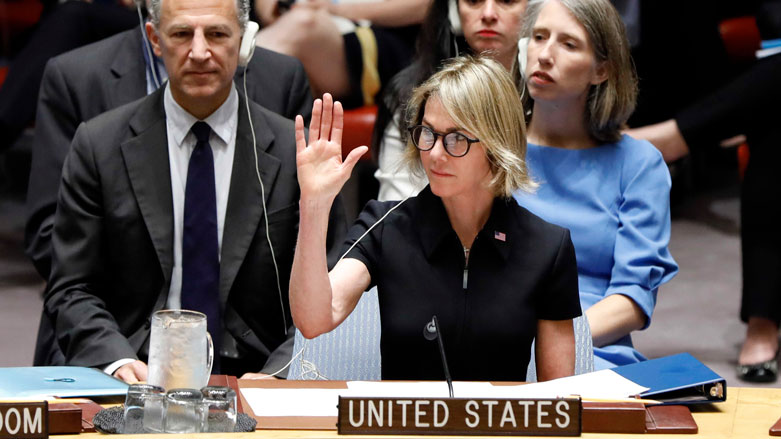US calls on Security Council to restore cross-border aid to northern Syria

ERBIL (Kurdistan 24) – The US Ambassador to the United Nations told the UN Security Council on Monday that cross-border deliveries of crucial humanitarian aid to northeastern Syria that have been blocked by Russia and China must be restored.
Since 2014, millions have relied on humanitarian and medical supplies brought into the country via four border crossings with Turkey, Iraq, and Jordan.
A December Security Council resolution called for renewing operations, excluding one border crossing in Jordan, for up to a year. Thirteen countries voted in favor of the measure, with permanent UNSC members Russia and China casting the votes that canceled in a move widely seen as an attempt by Russia to limit assistance to the area in support of Damascus.
Read More: Russia, China veto UN vote, limiting humanitarian aid to Syria
This effectively cut off areas in northern Syria held by the Kurdish-led Syrian Democratic Forces (SDF) eastward directly to Iraq. As a result, the areas became more dependent on Damascus’s approval for UN aid, further weakening the autonomy of the local Kurdish-led self-administration.
Read More: Syrian Kurds criticize UN decision limiting humanitarian aid to Syria
“The Council must begin deliberations on how to implement the recommendations of the Secretary-General’s February the 25th report, including restoring life-saving, UN cross-border assistance to over 1 million people in the northeast,” US Ambassador Kelly Craft said at Monday’s session.
“Because of how rapidly COVID-19 is spreading, these vulnerable Syrians simply cannot wait on Damascus’ arbitrary approvals of cross-line delivery of medical supplies.”
Amy Holmes, a scholar at Harvard’s Kennedy School, told Kurdistan 24 that the humanitarian situation in Northeast Syria was dire already before the outbreak of the coronavirus.
“It could now get exponentially worse since vetoes by Russia and China reduced the UN’s ability to deliver medical supplies by 41%. I fully agree with Ambassador Kelly Craft’s call to open another border crossing.”
“There are an estimated 4 million people in Northeast Syria, but only 35 ICU beds, and zero test kits. It’s time for the WHO to provide the medical supplies that they need - now.”
But Syrian Kurds have been critical of the UN Secretary-General report, since it suggested using the Tal Abyad border crossing with Turkey as an alternative to the Yaroubiyeh crossing.
The cities of Tal Abyad and Serekaniye (Ras al-Ain) came under Turkish control and its militant proxies in October 2019 during its so-called Peace Spring Operation.
Luqman Ahmi, the spokesperson for the Kurdish-led self-administration for the northeast of Syria, told Kurdistan 24 that they simply do not trust Turkey “since Turkey has already attacked this area (in October 2019) and displaced 300,000 people, and they are now living in camps.”
Since October, Turkish-backed armed groups have cut the flow of water at least four times from the Alook reservoir and pumping station near Ras al-Ain (Serekaniye) to multiple cities and towns in Hasakah province, depriving some 460,000 people in the region of the essential resource.
Dozens of human rights organizations have warned that, aside from the disastrous effects this would have on the vulnerable populations in the area at any time, it now puts them at extreme risk for mass outbreaks of the coronavirus.
Read More: Turkish-backed groups in Syria 'weaponizing water in global pandemic': HRW
The water flow was recently restored on Monday after being cut off on two days earlier, the Syria-based Rojava Information Centre reported. But on Thursday afternoon, the supply was again halted after Turkish-backed groups shelled the water pipeline near Alook.
Ahmi said, “Turkey is cutting off water for these (displaced) people, so there is no trust in Turkey managing this border crossing.”
The UN Secretary-General’s report, however, claimed that Turkey “has provided assurances, based solely on United Nations independent assessments of need, that aid could cross from Turkey into all areas of the north-east.”
US State Department Spokesperson Morgan Ortagus also told reporters in early March that the US strongly supported the UN suggestion to use the alternative route through Tal Abyad to deliver aid.
Sinam Mohamad, the representative of the Syrian Democratic Council (SDC) in the USA, also told Kurdistan 24 that she doubts Turkey would allow aid into northeast Syria after Turkey continued to cut water flows to the northeast.
“Tal Abyad is under their control, so the problem would not be solved.”
“Now we don’t have any other border crossing apart from the Semalka border crossing which does not have any humanitarian support from the UN,” he said. “This affects the people of the northeast of Syria.”
Ahmi argued that those who offer Tal Abyad as an alternative are ignoring Turkey’s repeated actions in Syria.
“Everyone can see what Turkey has been doing in Afrin, Serekaniye or any other area,” continued Ahmi.
“Turkey is not a country that respects human rights, rather it commits massacres against civilians and violates international humanitarian law.”
In March, the UN Commission of Inquiry on Syria reported that Turkish-backed groups had been carrying out war crimes and other human rights violations in Serekaniye and Tal Abyad, similar to human rights violations Afrin that Turkish-backed groups took control of in March 2018.
Read More: UN: Turkish-backed groups carry out war crimes, target Kurdish women
Since both Ankara and Damascus appear to be continuing a strategy of putting pressure on the local Kurdish-led administration by intentionally limiting access to basic means of survival to civilians in areas under its control, concluded Ahmi, “The problem won’t be resolved unless Yaroubiya is reopened.”
Editing by John J. Catherine
